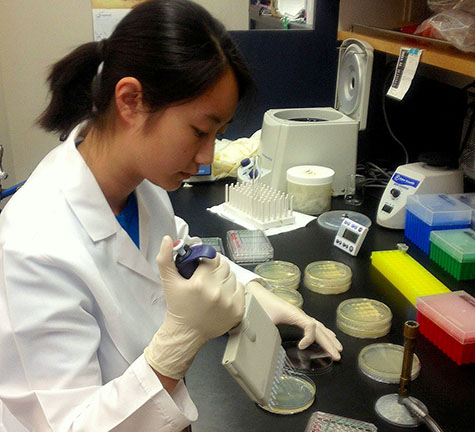
Each year, the Department of Biology in Arts & Sciences at Washington University in St. Louis awards a prize to a graduating senior in memory of Marion Smith Spector, a 1938 WUSTL graduate who studied zoology under the late Viktor Hamburger, PhD.
Hamburger was a professor of biology and a prominent developmental biologist who made many important contributions while a WUSTL faculty member.
The Spector Prize, first awarded in 1974, recognizes academic excellence and outstanding undergraduate achievement in research. Students are nominated by their research mentors for outstanding research that has made substantial contributions to a field.
This year, the prize has been awarded to Deborah Huang, who plans to graduate this month with a major in biochemistry and molecular biology and a minor in public health.
Huang worked in the lab of Christina Stallings, PhD, assistant professor of molecular microbiology in the School of Medicine.
The Stallings Laboratory focuses on the adaptation of Mycobacterium tuberculosis, the microbe that causes tuberculosis, to host-inflicted stresses and persistent infection. At least 30 percent of the world’s population is infected with latent M. tuberculosis, which in some individuals reactivates and causes disease. Globally, 1.8 million people die of tuberculosis each year. This health crisis is exacerbated by the alarming emergence of multi-drug and extensively drug-resistant strains.
Huang studied a protein involved in the stress response of M. smegmatis, a mycobacterium that closely resembles M. tuberculosis but is not pathogenic. Huang showed that this protein is expressed in greater abundance whenever the bacterium’s DNA is damaged, either by oxidative stress or by antibiotics, and is essential to the bacterium’s survival.
In her letter of nomination, Stallings wrote that Huang “successfully learned a range of scientific approaches in her work, showing an impressive level of versatility in the laboratory. Thus, although she is still early in her scientific career, she already has an exceptional level of laboratory experience and a mature sense of research science.”
Stallings also praised Huang’s participation in the intellectual life of the lab, remarking that she asked insightful questions about her own project but also about the projects of other lab members, and she ended every day by asking others if there was anything she could do to help them before she left.
Huang said her four years in the Stallings lab gave her a chance to weave together all of the science she had learned in lectures and to connect the detailed world of molecular biology with the bigger picture of public health. “As a freshman,” she said, “I had no idea where I would be as a senior; these four years have been transformative.”
Huang will be attending medical school next year, most likely at Northwestern University’s Feinberg School of Medicine. She plans to pursue an MD/MPH with a focus in infectious disease. Clinical and public health research will be a large part of the career that she envisions.
As part of the Biology Department’s recognition of her outstanding work, Huang will be recognized at the Biology Honors and Research Emphasis Reception, which will be held at 3:30 p.m. Wednesday, May 14, in McDonnell Hall, Room 162.